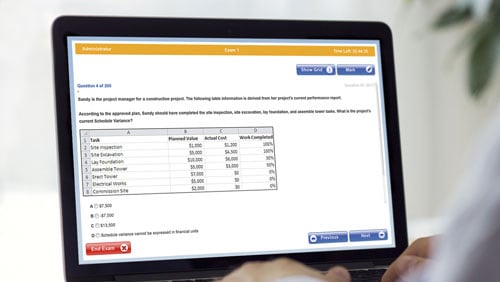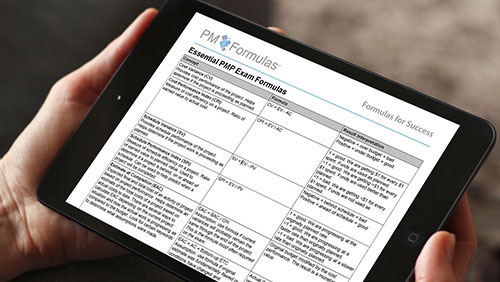PMP® Exam Lessons Learned from Certified PMP, Scott Coonrod
 Is studying for and obtaining your Project Management Professional (PMP)® Certification one of your personal or career goals? Are you wondering about things such as where is a good place to start, what materials might be the most helpful in studying, or how many practice tests are just right or too many? Are you interested in the experiences and insights of those who have been there, were once also wondering many of the same things, and who have recently passed the Project Management Professional (PMP)® Exam?
Is studying for and obtaining your Project Management Professional (PMP)® Certification one of your personal or career goals? Are you wondering about things such as where is a good place to start, what materials might be the most helpful in studying, or how many practice tests are just right or too many? Are you interested in the experiences and insights of those who have been there, were once also wondering many of the same things, and who have recently passed the Project Management Professional (PMP)® Exam?
If any of these questions sound familiar to you then there is a forum you need to explore on The PM PrepCast website. Every post is from those who have recently obtained their Project Management Professional Certification and are willing to provide tips and information concerning their study methods and experiences taking the PMP Exam. These individuals most likely were where you are today, full of questions and concerns, and looking for a place with information and answers.
Let’s take a look at one example from this forum. It was written by Scott Coonrod, PMP, not too long after he obtained his PMP certification. In his PM PrepCast Forum post he discusses how he studied for and prepared for both the PMP Exam and the exam day itself along with his experiences at the test site.
Lessons learned and other tips related to preparing for the PMP Exam:
- Find others who are also studying to obtain their PMP Certification and review key items in the PMBOK® Guide together. Studying with others is a great support system during the exam preparation process.
- Go through The PM PrepCast lessons and take notes on the material being presented. Even if you do not go back and refer to the notes at a later date they will serve as a good method for retaining the material. Taking notes can help you ‘learn’ the material, not just ‘memorize’ it.
- Take the quizzes after each PM PrepCast Lesson. If you feel as if you missed too many answers, you can always go back and listen to the presentation again or review the notes you had taken.
- Answer many, many, many practice questions. The study guide mentioned below comes with a CD with two 200 question sample exams and an option to obtain a third sample exam.
- Download free PMP Exam question apps. The great thing about these apps is that many have 25-50 questions each that you can answer whenever you have a free moment.
- As you are nearing your PMP Exam date create a data dump sheet with key formulas, definitions, and other items you want to make sure you remember for exam day. Practice recreating it; because that is what you are going to need to do on your exam day.
Lessons learned and other tips related to PMP Exam study materials:
- Read the most current version of The PMBOK® Guide together with others who are also looking to pass the PMP Exam if possible.
- Additional suggested study material includes “Project Management Professional Study Guide (Fourth Edition)” by Joseph Phillips. This study guide provides you an interactive quiz that indicates not only ‘if’ you answered correctly or incorrectly, but also ‘why’ the answer was correct or incorrect, as you answer each question. These quizzes were a great introduction to how questions may be framed on the actual PMP Exam. Some questions may be worded in ways that may seem misleading. For example, some questions may provide much more information than what is needed to answer a question, and some other questions may require you to choose the MOST correct answer from a list that may have what seems like several correct answers.
Lessons learned and other tips related to taking the PMP Exam:
- Know where your exam site is. If you live far away from the exam site and can’t drive by, make sure you have reliable directions and know if there is construction on the route to the Pearson VUE Test Center. Allow for plenty of time to get to the site without causing yourself unnecessary additional stress.
- Remember to have your two forms of identification because you will need to prove who you are in order to take the exam.
- Do not bring too much stuff with you. You will have to lock everything up because you can’t take anything into the exam room with you.
- If you are nervous about taking a computer based exam, don’t worry because there is an optional 15 minute tutorial at the beginning of the exam that does not count toward your PMP Exam time.
- If you start to feel nervous or overwhelmed, take a few deep breaths, tell yourself “you’ve got this”, and keep going.
- Answer all of the questions you know and mark those you don’t for follow up. Some questions/answers later in the exam may help you answer those you had marked.
These are just a few examples of the PMP Exam related lessons learned and other tips offered by someone who has recently been in your shoes and has shared his experiences. You can access these lessons learned and other tips and many more in The PM PrepCast Forum at http://www.pm-prepcast.com/kunena/lessons-learned.
This article was co-authored by Cornelius Fichtner, PMP, CSM and Scott Coonrod, PMP. Below is our guest author's short biography:
Scott Coonrod, PMP recently obtained his PMP certification (April 2014) and has 17 years of experience in the electric motors industry; mostly leading or championing projects. He currently is developing and leading the Project Management Office (PMO) for the manufacturing operations of a multi-billion dollar global manufacturer of motors, generators, switch gear, and mechanical gearing aimed at converting power into motion to help the world run more efficiently.


